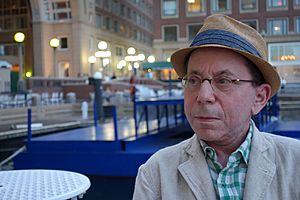Mark Fischer (attorney) facts for kids
Quick facts for kids
Mark Alan Fischer
|
|
|---|---|
 |
|
| Born | September 28, 1950 |
| Died | February 18, 2015 (aged 64) |
| Nationality | American |
| Education | Boston College Law School, J.D., 1980 |
| Occupation | Author, lawyer |
Mark Alan Fischer (born September 28, 1950, died February 18, 2015) was a lawyer from Boston. He was an expert in intellectual property and copyright law. These types of law help protect people's ideas, inventions, and creative works like books or music.
Fischer also gave talks and wrote books about publishing law. He was a partner at a law firm called Duane Morris LLP. He helped many different clients, from big companies to individuals. His work included entertainment law, which deals with legal issues in movies, music, and TV. He also worked on copyright disputes and laws about social media.
One important thing he did was help create the Biobricks Foundation Public Agreement. This agreement makes it easier for scientists to share their biotechnology tools with others. This helps new discoveries happen faster.
Fischer was allowed to practice law in several places. These included Massachusetts, New York, and in certain U.S. federal courts. He was a big fan of the Red Sox baseball team. He especially loved a famous play from their 2004 World Series win.
Teaching and Sharing Knowledge
Mark Fischer loved to teach others about law. He taught copyright law at several universities. These included Suffolk University Law School and Boston College Law School. He also taught at Berklee College of Music.
He wrote a lot and gave many lectures. He had a popular blog where he shared his ideas. This blog focused on new media and intellectual property. He was also a leader in important groups. He was a Trustee of the Copyright Society of the US. He was also an Overseer of the Institute of Contemporary Art in Boston.
Helping Open Source Software
Fischer played a part in the idea and use of the GNU General Public License. This is a special license that helps make computer software "free" and open for everyone to use and change. It's a big part of how many computer programs work today.
 | Tommie Smith |
 | Simone Manuel |
 | Shani Davis |
 | Simone Biles |
 | Alice Coachman |

